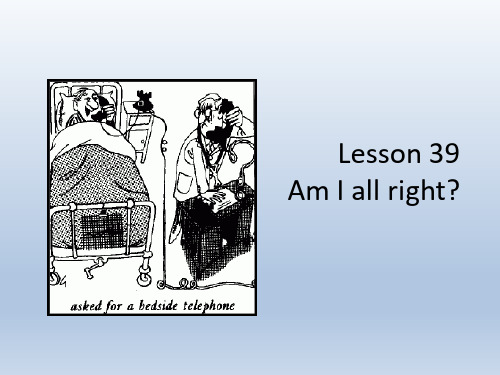新概念英语第二册39课
新概念英语第二册39课

1、人称的转变
1)直接引语中的第一人称随主句主语变 如: He said,“I am very sorry.” ——>He said that he was very sorry. 2)直接引语中的第二人称随主句谓语变 如: “You should be more careful next time,” my father told me. ——> My father told me that I should be more careful the next time.
2、时态的转换 直接引语改为间接引语时,主句中的谓语动词 如果是过去时,从句(即间接引语部分)的谓语动词在时态方 面要作相应的变化,变成过去时范畴的各种时态(实际也是宾 语从句的时态要求),变化如下:
直接引语 间接引语 一般现在时 一般过去时 一般过去时 过去完成时 现在进行时 过去进行时 现在完成时 过去完成时 过去完成时 过去完成时 过去进行时 过去进行时 一般将来时 过去将来时
3)地点状语:here变成there She said, “I won't come here any more.” ——> She said that she wouldn’t go there any more. 4)动词:come变成go,bring变成take 5、直接引语变间接引语,句子结构的变化 1)陈述句。用连词that引导,that在口语中常省略。主 句的谓语动词可直用接引语中的said, 也可用told来代替, 注意,可以说said that, said to sb. that, told sb. that, 不可直接说told that,
如: He asked me, “Will you go to the station with me to meet a friend of mine this afternoon?”
新概念英语第二册Lesson39AmIallright?(课文详解练习)讲义

新概念英语第二册Lesson 39Am I all right? 我是否痊愈?While John Gilbert was in hospital, he asked his doctor to tell him whether his operation had been successful, but the doctor refused to do so. The following day, the patient asked for a bedside telephone. When he was alone, he telephoned the hospital exchange and asked for Doctor Millington. When the doctor answered the phone, Mr. Gilbert said he was inquiring about a certain patient, a Mr. John Gilbert. He asked if Mr. Gilberts operation had been successful and the doctor told him that it had been. He then asked when Mr. Gilbert would be allowed to go home and the doctor told him that he would have to stay in hosptial for another two weeks. Then Dr. Millington asked the caller if he was a relative of the patient. No, the【课文翻译】While John Gilbert was in hospital, he asked his doctor to tell him whether his operation had been successful, but the doctor refused to do so. 当约翰.吉尔伯特住院的时候,他问医生他的手术是否成功,但医生拒绝告诉他The following day, the patient asked for a bedside telephone. 第二天,这位病人要了一部床头电话。
新概念英语第二册课后练习题答案详解(第39课)

新概念英语第二册课后练习题答案详解(第39课)新概念英语第二册课后习题 Lesson 391. d根据课文描述的情况只有d. to find out about hisoperation(查出他手术的情况)是John Gilbert wanted a bedside telephone(约翰·吉尔伯特要床头电话)的真正目的,而其他3个选择都不是他要床头电话的目的,所以选d.2. a根据课文第10行Then Dr. Millington asked the caller if he was a relative of the patient 能够看出,只有选a. was a relative of John Gilbert 才符合医生当时的心里猜测,而其他3个选择都不是医生当时想的,所以应该选a.3. c只有c. to 最合乎语法。
a. at , b. in , d. on 这3个介词都不合适。
4. da. say him不合乎语法,say后面应该加to,表示"对他说"b. tell to him 不合乎语法,tell后面应不带to,直接跟间接宾语him,意思是"告诉他"c. speak him 也把合乎语法,speak后面应该加to表示"对他讲",所以选d.5. d只有d.是最准确的疑问句What did he ask for? (他要求得到什么?) 回答是:A bedside telephone. a. For what did he ask 不合乎语法;b. what did he ask (他问了什么?) 后面缺少for, 意思就不同了;c. For what did he ask for 不合乎语法,前面不应该有for.6. a只有选a. let him go(让他走)才能同前一句When will he be allowed to go home(他什么时候能够回家。
Am I all right?我是否痊愈?-新概念英语第二册自学导读笔记第39课

Am I all right?我是否痊愈?-新概念英语第二册自学导读笔记第39课新概念英语第二册第39课课文重难点 further notes on the text1.am i all right?(标题)我是否痊愈?all right 在不同的上下文中会有不同的含义。
当指人的健康状况时,它能够表示"安然无恙的"、"良好的":i was not very well last week, but i feel all right now.我上星期有点不舒服,不过我现在觉得好了。
2.… he asked his doctor to tell him whether his operation had been successful, but the doctor refused to do so.……他问医生他的手术是否成功,但医生拒绝告诉他。
whether引导的从句在句中作动词 tell 的直接宾语,是一个间接一般疑问句。
(cf.本课语法)so在这里为代词,代替前面的动词不定式(在 to tell himwhether…)。
它一般出现 believe, do, expect, hope, say, tell, think, appear等之后:3.the following day, the patient asked for a bedside telephone. 第2天,这位病人要了一部床头电话。
(1)following 在这里相当于next,表示"紧接着的"、"其次的"。
(2)ask for 在这句话中表示"请求"、"要求(得到某个东西)";在下一句话(…asked for doctor millington)中它表示"要求(某人)来(接电话)"。
4.…mr.gilbert said he was inquiring about a certain patient ,a mr.john gilbert.……吉尔伯特先生说他想询问一个病人的情况,是一位名叫约翰·吉尔伯特的先生。
新概念英语第二册Lesson39课件共17张PPT

NCE II L39
New words and expressions
operation 手术
[ˌɒpəˈreɪʃn] n.
The doctor advised an immediate operation . operate vi. (对…)动手术
Mr Gilbert’s operation had been successful and the doctor told him that it had been. He then asked when
Mr Gilbert w___o_u__l_d__b__e_(be) 10 allowed to go home and the doctor told him that he would have to _s_t_a__y_____
(stay) 11 in hospital for another two weeks. Then Dr. Millington asked the caller if he was a relative of the patient. “No,”the patient answered, “I am Mr John Gilbert.
New words and expressions
inquire 询问,打听
[ɪn'kwaɪə(r)] v.
inquire sth. of sb. 从某人那打听 inquire about sth./sb.
New words and expressions
certain adj. 某个
[ˈsɜ:tn]
新概念英语第二册Lesson 39 (PDF版课件 )

New words and expressions
• In exchange, you teach me how to clean.
GRAMMAR
Grammar
• 定义:当一个句子作宾语时,这个句子就 叫做宾语从句。
• 179 • 180页
Grammar
• 用法:在谓语动词、介词、动词不定式等 后面都可以接宾语从句。
Comprehension questions
• The doctor refused to, didn't he? • Yes, he did.
Comprehension questions
• What did the patient ask for the following day?
• For a bedside telephone.
• in hospital • 住院
Text
• The following day, the patient asked for a bedside telephone.
• asked for 请求,索要
Text
• He asked me for a meal and a glass of beer. • NCE2 Lesson6
operation n.
• the process of cutting into someone’s body to repair or remove a part that is damaged
• 手术
New words and expressions
• operation on • She’s going to need an operation on her ankle.
裕兴新概念英语第二册完美打印版笔记_第39课
Lesson 39 Am I all right? 我是否痊愈?单词operation n.手术operate V.1)操作,操纵(机器等),运作,运转( control,run) operate a machine操纵一台机器operate the lift开电梯例:This sewing machine doesn't operate properly.这台缝纫机不太好用了。
2)经营,管理(run, manage)operate a company经营一家公司例: The company operate ten factories.这家公司管理十个厂子。
The business operate in various counties.那家企业在许多国家都有业务。
3)动手术operate on sb for--为谁动手术例: The surgeon decided to operate on her for appendicitis(盲肠)promptly.这个外科医生决定立刻为她做盲肠手术physician 内科医生operation n.手术,运转,操作operation instruments 手术器械例:I had an operation on my heart../I underwent an operation on my heart.我做了一次心脏手术。
the operation of an old machine IH机器的运转bring into operation /put into operationvt.实施(法律,计划等),运作(机械等)come into operation V1.实施,开始运转例: The new rules will come into operation next month./The new rules will be put into operation next month. 新的规章制度下个月开始实施。
新概念英语第二册第39课课件
10.relative
(n.) 亲戚,亲属=relation close/distant relatives relationship (n.) 关系
Notes on the text
1.While
John Gilbert was in hospital, he asked his doctor to tell him whether his operation had been successful. be in hospital 住院 be in the hospital 在医院里 whether=if 2.The following day, the patient asked for a bedside telephone. the following day= the next day a bedside telephone 床头电话
alone (adj.) 单独的,独自的 be alone e.g. I’m alone at home today. lonely (adj.) 孤独的,寂寞的 e.g. feel lonely 6.exchange (v.) 调换,更换 exchange A for B e.g. exchange a red dress for a blue one 交换,互换 exchange seats exchange ideWhen
he was alone, he telephoned the Hospital Exchange and asked for Doctor Millington. the Hospital Exchange 医院的电话交换台 ask for sb. 要…接电话
4.a
新概念英语第二册课件Lesson39(共29页)
间接引语 then that day that night the next day the day before that week(month, year…)
the week(month, year…) before the next week(month, year ...) three days(months, years …) before
• reject to do sth.
• reject sth.
• refuse to do sth. • refuse sb.
• decline 委婉的拒绝 refuse politely • decline to do sth. • decline sb.
• 1.While John Gilbert was in hospital, he asked his doctor to tell him whether his operation had been successful, but the doctor refused to do so.
• vt.交换, 调换
They exchanged experience at the meeting. ask for: 要求,请求
• 4.When the doctor answered the phone, Mr. Gilbert said he was inquiring about a certain patient, a Mr. John Gilbert.
have a cold have a fever
toothache stomachache
have a headache
have a sore throat
裕兴新概念英语第二册笔记_第39课_课文讲解
TextWhile John Gilbert was in hospital, he asked his doctor to tell him whether his operation had been successful,but the doctor refused to do so. The following day, the patient asked for a bedside telephone. When he was alone, he telephoned the hospital exchange and asked for Doctor Millington. When the doctor answered the phone, Mr. Gilbert said he was inquiring about a certain patient, a Mr. John Gilbert. He asked if Mr. Gilbert's operation had been successful and the doctor told him that it had been. He then asked when Mr. Gilbert would be allowed to go home and the doctor told him that he would have to stay in hosptial for another two weeks. Then Dr.Millington asked the caller if he was a relative of the patient. 'No,' the patient answered, 'I am Mr. JohnGilbert.'While John Gilbert was in hospital, he asked his doctor to tell him whether hisoperation had been successful, but the doctor refused to do so.所问的原句是:“Was my operation successful?”while adj. 1adj当...的时候,和..同时,只要eg He took a bath while I was preparing dinner. 我在准备饭的时候,他洗了个澡。
- 1、下载文档前请自行甄别文档内容的完整性,平台不提供额外的编辑、内容补充、找答案等附加服务。
- 2、"仅部分预览"的文档,不可在线预览部分如存在完整性等问题,可反馈申请退款(可完整预览的文档不适用该条件!)。
- 3、如文档侵犯您的权益,请联系客服反馈,我们会尽快为您处理(人工客服工作时间:9:00-18:30)。
如: Our teacher said to us, “Light travels faster than sound.” ——> Our teacher told us that light travels faster
than sound.
6)当引语是谚语、格言时,
示过去的时间时,
如: He said,“When I was a child, I usually played
football after school.”
——> He said that when he was a child, he usually
played football after school.
alone with 与…一起
Exchange vt.1. 换,更换,调换,掉换:
Most store will allow the customers to exchange their goods.
大多数商店将允许顾客更换商品。 2. 换回,换来,换取 3. 把…换成;用…交换;兑换(for)
变化要因实际情况而定,不能机械照搬,如果当地转述,
3)地点状语:here变成there
She said, “I won't come here any more.”
——> She said that she wouldn’t go there any more.
4)动词:come变成go,bring变成take 5、直接引语变间接引语,句子结构的变化 1)陈述句。用连词that引导,that在口语中常省略。主 注意,可以说said that, said to sb. that, told sb. that, 不可直接说told that,
3、直接引语变成间接引语时,从句时态无
须改变的情况
1)当主句的谓语动词是一般现在时的时候, 如: He always says, “I am tired out.” ——>He always says that he is tired out. 2)当主句的谓语动词是将来时的时候,
如: He will say, “I’ll try my best to help you.”
——> He told us that he would give us an examination
the next Monday.(不可说told that) 2)直接引语为一般疑问句,(也称是否疑问句,)间接 引语用连词whether或if引导,原主句中谓语动词said要 改为asked(me/him/us等),语序是陈述句的语序,这
Patient
adj.1. 忍耐的;容忍的
2. 坚忍的;耐心的 3. 沉着的;不急躁的 4. 耐心等待的;显出有耐心的 5. 勤快的;孜孜不倦的 n. 1.病人;患者 2. 受动着;承受者
Phrases: patient of 能忍受 patient with 对……有耐心 patient care 病患照顾
一点非常重要。
如: He said, “Do you have any difficulty with pronunciation?”
——>He asked(me)whether/if I had any difficulty
with my pronunciation.
3) 直接引语为选择疑问句,间接引语用
——>He will say that he will try his best to help me.
3)当直接引语部分带有具体的过去时间状语时
如: He said, “I went to college in 1994.” ——>He told us that he went to college in 1994. 4)当直接引语中有以when, while引导的从句,表
whether…or…表达,而不用if…or…,也不用
either…or….
如: He asked, “Do you speak English or French?”
——> He asked me whether I spoke English or French.
4)直接引语为特殊疑问句,改成间接引语时,原来 的疑问词作为间接引语的连词,主句的谓语动词用 ask(sb.)来表达,语序改为陈述句语序。
to, need时
如:She asked, “Must I take the medicine?”
——> She asked if she had to take the medicine.
„注‟:此处用had to代替must更好 8)此外转述中的 here不必改为there, 动词come不必改为go,如果当天转 述yesterday, tomorrow, this afternoon等均不必改变。
mental patient 精神病人
alone adj. 1. 孤零的,孤单的 2. 单独的;孤独的 adv. 1. 孤零地,孤单地,孤独地 2. 单独地 3. 独自地;孤立无援地 4. 只,只有;仅仅
Phrases:
let alone 更不必说;听任;不打扰 stand alone 孤立;独一无二
2、时态的转换 直接引语改为间接引语时,主句中的谓语动词 如果是过去时,从句(即间接引语部分)的谓语动词在时态方 面要作相应的变化,变成过去时范畴的各种时态(实际也是宾 语从句的时态要求),变化如下:
直接引语 间接引语
一般现在时 一般过去时
一般过去时 过去完成时
现在进行时 过去进行时 现在完成时 过去完成时 过去完成时 过去完成时 过去进行时 过去进行时 一般将来时 过去将来时
Successful n. 成功的,一帆风顺的
Phrases: successful in 在…成功的 Others:
Success n. 成功
Succeed v. 成功 Succession n. 连续;继位;继承权 Successor n. 继承者
Following adj. 下面的;其次的,接着的 n. 下列事物;一批追随者 v. 跟随;沿行(follow的ing形式) prep. 在…之后,接着 Phrases: in the following 在下面;在下文中 immediately following 紧跟着 following system 跟踪系统 following in order 循序
I'd like to exchange this dress for one in a smaller size.
我想把这件衣服换一件小点尺寸的。 4. 交换,互换,轮换 (with):
Inquire vt. 问,打听,询问 vi.1. 问,打听,询问 2. 调查,查问(常与into连用)
Phrases: inquire into 调查,探究 inquire about 询问,查问;打听 inquire of 询问;打听 inquire for 求见;要找 inquire after 问候;询问起
如: He said,“Practice makes perfect.” ——>He
said that practice makes perfect.
7)当直接引语中有情态动词should, would, could,
had better, would rather, might, must, ought to, used
certain adj.1. 确凿的,毫无疑问的 2. 确定的;固定的 3. 必定的,必然的 4. 可靠的,可信赖 的 pron. 某些;某几个
Phrases: a certain extent 一定程度上 a certain degree 到某种程度 for certain 肯定地;确凿地 certain level 某一水平
句的谓语动词可直用接引语中的said, 也可用told来代替,
如: He said, “I have been to the Great Wall.”
——>He said to us that he had been to the Great Wall.
He said, “I'll give you an examination next Monday.”
如: He asked,“What's your name?”
——> He asked(me)what my name was.
5)直接引语为祈使句时,改为间接引语,用带to的
不定式表达,谓语动词常是ask, advise, tell, warn,
order, request等。如ask sb. to do,(由肯定祈使句
变成)ask sb. not to do(由否定祈使句转变),并
且在不定式短语中的时间状语、地点
• 1)人称 • 人称的变化——“一主、二宾、三不变”。 意为在改为间接引语时,直接引语里的第 一人称照主句的主语变化。第二人称看主 语的宾语而变化,第三人称无需变化。
• 2) 句式/连词
• 3)指示代词、时间状语、地点状语、方向性动 词的变化
Relative adj. 1. 相互有关的;休戚与共的 2. 与…有关的;相关的 3. 比较而言的 4. 相对的 Even its successes are only relative. 即使成功也只是相对的。 It is a gift for my relative in my hometown. 这是我送给家乡一位亲戚的礼物。
Lesson 39 Am I All Right ?
1、人称的转变
1)直接引语中的第一人称随主句主语变
如: He said,“I am very sorry.”
